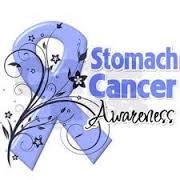Stomach cancer
Stomach cancer is cancer that occurs in the stomach — the muscular sac located in the upper middle of your abdomen, just below your ribs. Your stomach receives and holds the food you eat and then helps to break down and digest it.
Another term for stomach cancer is gastric cancer. These two terms most often refer to stomach cancer that begins in the mucus-producing cells on the inside lining of the stomach (adenocarcinoma). Adenocarcinoma is the most common type of stomach cancer.
Causes
Doctors aren’t sure what causes stomach cancer. There is a strong correlation between a diet high in smoked and salted foods and stomach cancer. As the use of refrigeration for preserving foods has increased around the world, the rates of stomach cancer have declined.
In general, cancer begins when an error (mutation) occurs in a cell’s DNA. The mutation causes the cell to grow and divide at a rapid rate and to continue living when a normal cell would die. The accumulating cancerous cells form a tumor that can invade nearby structures. And cancer cells can break off from the tumor to spread throughout the body.
Types of stomach cancer
The cells that form the tumor determine the type of stomach cancer. The type of cells in your stomach cancer helps determine your treatment options. Types of stomach cancer include:
- Cancer that begins in the glandular cells (adenocarcinoma).The glandular cells that line the inside of the stomach secrete a protective layer of mucus to shield the lining of the stomach from the acidic digestive juices. Adenocarcinoma accounts for the great majority of all stomach cancers.
- Cancer that begins in immune system cells (lymphoma).The walls of the stomach contain a small number of immune system cells that can develop cancer. Lymphoma in the stomach is rare.
- Cancer that begins in hormone-producing cells (carcinoid cancer).Hormone-producing cells can develop carcinoid cancer. Carcinoid cancer in the stomach is rare.
- Cancer that begins in nervous system tissues.A gastrointestinal stromal tumor (GIST) begins in specific nervous system cells found in your stomach. GIST is a rare form of stomach cancer.
Risk factors
Factors that increase your risk of stomach cancer include:
- A diet high in salty and smoked foods
- A diet low in fruits and vegetables
- Eating foods contaminated with aflatoxin fungus
- Family history of stomach cancer
- Infection with Helicobacter pylori
- Long-term stomach inflammation
- Pernicious anemia
- Smoking
- Stomach polyps
Symptoms
Signs and symptoms of stomach cancer may include:
- Fatigue
- Feeling bloated after eating
- Feeling full after eating small amounts of food
- Heartburn that is severe and persistent
- Indigestion that is severe and unrelenting
- Nausea that is persistent and unexplained
- Stomach pain
- Vomiting that is persistent
- Weight loss that is unintentional
Homoeopathic Treatment
The scope of Homeopathy for cancer management varies depending on the type of cancer, stage of cancer and the general health of the patient. Following are some of the aspects of Cancer management with Homeopathy:
- One of the most distressing complaints associated with some varieties of Cancer is the agonizing pain. Conventional medicines can provide pain relief but only to a certain extent and these medicines are not without any side effects. Moreover there is always a restriction to the dosage that can be safely administered to the patient. The advantage of administering Homeopathic medicines in such cases is that there can be effective pain control without inducing any side effects.
- Homeopathy can help in improving the general well being and vitality of the patient.
- Conventional treatment options for cancer (chemotherapy, radiotherapy, etc) are associated with distressing side effects and homeopathy can play a definitive role to counter these side effects.
- The diagnosis of cancer often leaves the patient with a sense of depression, anxiety and fear. The treatment may induce additional irritability, impatience and mood fluctuations. Homeopathy can influence the psyche of the patient and help him to deal with these emotions in a better way.
- Homeopathic medicines may also have a role to play in controlling the pace at which the disease increases and spread of the disease to other organs.
Homeopathic medicines can also be administered along with the allopathic medicines.

